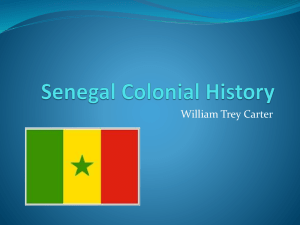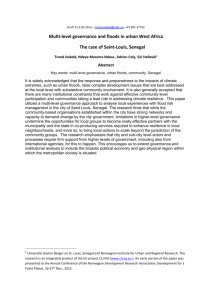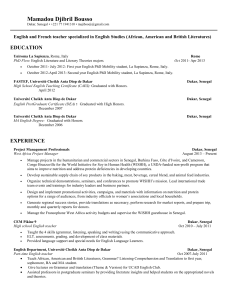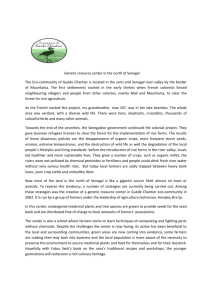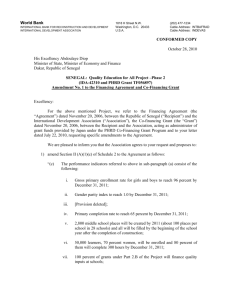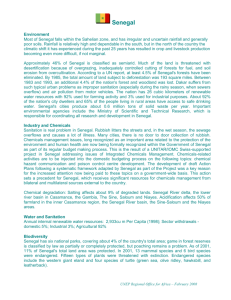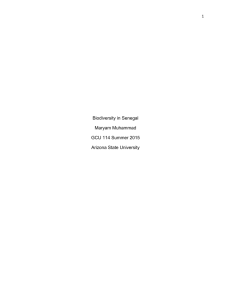India-Senegal Relations - The Ministry of External Affairs
advertisement
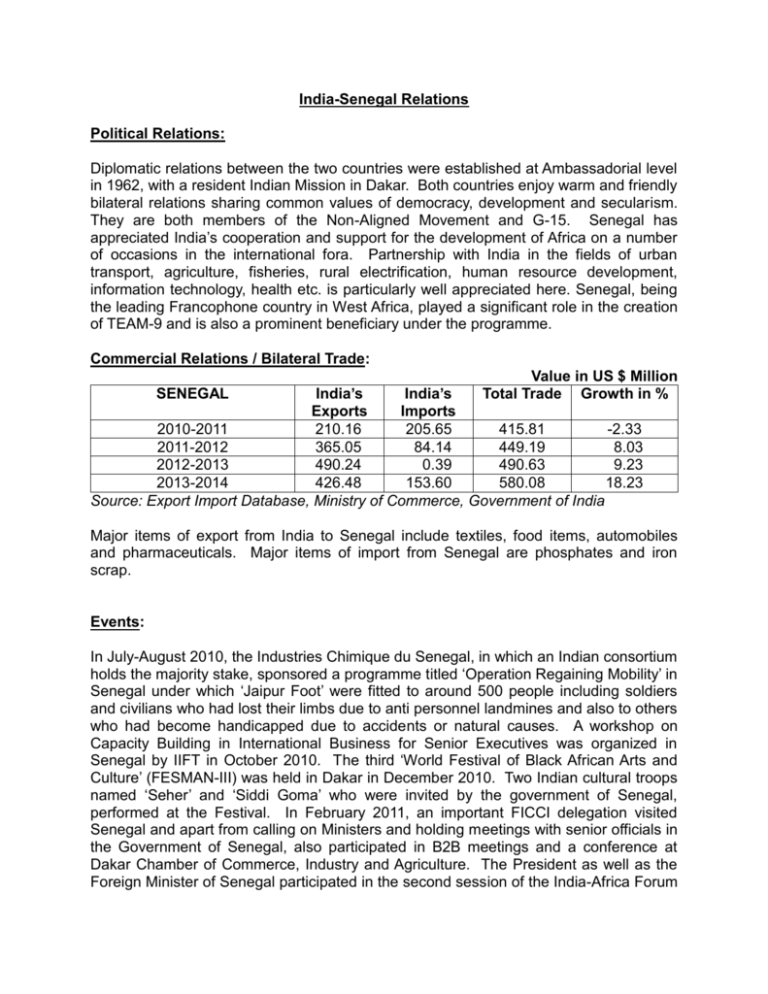
India-Senegal Relations Political Relations: Diplomatic relations between the two countries were established at Ambassadorial level in 1962, with a resident Indian Mission in Dakar. Both countries enjoy warm and friendly bilateral relations sharing common values of democracy, development and secularism. They are both members of the Non-Aligned Movement and G-15. Senegal has appreciated India’s cooperation and support for the development of Africa on a number of occasions in the international fora. Partnership with India in the fields of urban transport, agriculture, fisheries, rural electrification, human resource development, information technology, health etc. is particularly well appreciated here. Senegal, being the leading Francophone country in West Africa, played a significant role in the creation of TEAM-9 and is also a prominent beneficiary under the programme. Commercial Relations / Bilateral Trade: Value in US $ Million Total Trade Growth in % India’s India’s Exports Imports 2010-2011 210.16 205.65 415.81 -2.33 2011-2012 365.05 84.14 449.19 8.03 2012-2013 490.24 0.39 490.63 9.23 2013-2014 426.48 153.60 580.08 18.23 Source: Export Import Database, Ministry of Commerce, Government of India SENEGAL Major items of export from India to Senegal include textiles, food items, automobiles and pharmaceuticals. Major items of import from Senegal are phosphates and iron scrap. Events: In July-August 2010, the Industries Chimique du Senegal, in which an Indian consortium holds the majority stake, sponsored a programme titled ‘Operation Regaining Mobility’ in Senegal under which ‘Jaipur Foot’ were fitted to around 500 people including soldiers and civilians who had lost their limbs due to anti personnel landmines and also to others who had become handicapped due to accidents or natural causes. A workshop on Capacity Building in International Business for Senior Executives was organized in Senegal by IIFT in October 2010. The third ‘World Festival of Black African Arts and Culture’ (FESMAN-III) was held in Dakar in December 2010. Two Indian cultural troops named ‘Seher’ and ‘Siddi Goma’ who were invited by the government of Senegal, performed at the Festival. In February 2011, an important FICCI delegation visited Senegal and apart from calling on Ministers and holding meetings with senior officials in the Government of Senegal, also participated in B2B meetings and a conference at Dakar Chamber of Commerce, Industry and Agriculture. The President as well as the Foreign Minister of Senegal participated in the second session of the India-Africa Forum Summit (IAFS-2) meetings held in Addis Ababa in May 2011. A Cultural troop named ‘La Linguere’ visited India in June 2012 and participated in the Africa Festival held in New Delhi. The Engineering Export Promotion Council (EEPC) delegation visited Dakar from 16th – 20th January, 2013. Indian Council for World Affairs (ICWA) in collaboration with CODESER organized an Academic Conference on “India- Francophone Africa: Issues and Challenges’ on 17th – 18th October, 2013 in Dakar. Senegalese Foreign Minister, Mr. Mankeur Ndiaye, visited India from 14-17th January, 2014. Senegalese Minister of Culture and Heritage, Mr. Abdoul Aziz Mbaye, visited India from 29 th -31st January, 2014. A group of Indian scientists participated in a meeting on “Partnership in Applied Sciences, Engineering and Technology” held in Dakar from 10-12th of June, 2014. During the same month, an Indian delegation participated in 9th INTERPOLE Global programme held in Dakar. Investments: The largest investment from India in Senegal is in Industries Chimique du Senegal (ICS): ICS is the flagship company in Senegal which is in the business of manufacturing phosphoric acid from the rock phosphate available in plenty in Senegal. Many other companies including Tata Group (Tata Motors, Tata Unitech and Tata Africa-Senegal), Kirloskar Bros, Expotech, CSL Ltd, NIIT, Ranbaxy, Ajanta Pharma, Coppice Technologies Ltd., Lucky Group, Angelique, Inma International, Mohan Energy etc. are active in Senegal and the region. According to World Bank’s Doing Business in 2015 report, Senegal was one of the top ten improving countries, which means greater investment opportunities for India in future. . ITEC and other training and assistance programmes: For the financial year 2014-2015, 30 slots have been allotted for Senegal under ITEC programme whereas 10 Scholarship slots have been offered to Senegal under ICCR Scholarship Scheme for the academic year 2014-15. The Golden Jubilee of the ITEC programme was celebrated by the Mission in October 2014. Four Senegalese Scientists have won and availed the CV Raman International Fellowship for African Researches in the Year 2013-14. The Hub Earth Station of the Pan-African e-Network Project is located in Sebikotane village of Senegal. The project, inaugurated in February 2009 is now operational in 47 countries of Africa. India’s Duty Free Tariff Preference (DFTP) scheme is applicable for import of select commodities from Senegal. An Entrepreneurial Training & Development Centre (ETDC) was setup under G-15 Cooperation Programme (inaugurated in 2002). India has extended concessional Lines of Credit (LoC) to Senegal for (i) development of rural SMEs and purchase of agricultural machinery and equipment from India, (ii) supply of buses and spares by Tata International (Tata Motors), (iii) irrigation project; (iv) Women Poverty Alleviation Programme and acquisition of 400 vehicles from India, (v) IT Sector, hardware and logistics movement, (vi) rural electrification, (vii) fishing industry development project, (viii) acquiring railway coaches and locomotives from India, (ix) supply of medical equipment etc. to four hospitals in Senegal and (x) establishment of a slaughter house, with modern facilities, a tannery and livestock market. Most recently, in August 2014, India granted an LOC of US $ 62.95 million to Senegal for Rice-Sufficiency Programme Project. NRI Population: The Indian community numbers around 380 (three hundred and eighty). Most of them are working for Indian companies including those executing development projects under Lines of Credit extended by India. Some of them are running their own businesses. January, 2015

